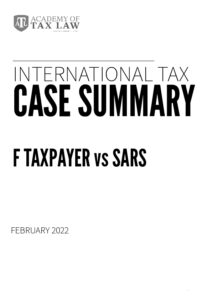F Taxpayer vs SARS: CASE SUMMARY
Home » Case Library »
F Taxpayer vs SARS: CASE SUMMARY
Case Information
- Court: Tax Court of South Africa, Western Cape Division, Cape Town
- Case No: IT 45842
- Applicant: F Taxpayer
- Defendant: Commissioner for the South African Revenue Service (SARS)
- Judgment Date: 25 February 2022
- Download the FULL JUDGMENT
Judgment Summary
In the matter of F Taxpayer v SARS, the Tax Court of South Africa was tasked with evaluating the procedural compliance and statutory adherence of the South African Revenue Service (SARS) in the taxpayer’s appeal concerning assessments for the 2016 to 2018 tax years. This case brought into focus SARS’s failure to meet prescribed deadlines and its subsequent application for condonation to excuse these delays. The judgment by Justice J.I. Cloete ultimately underscored the critical importance of procedural compliance by public bodies, especially when dealing with taxpayers’ rights to fair administrative action as guaranteed by the South African Constitution.
The case primarily involved two applications: the taxpayer’s request for a final order against SARS for its failure to timely deliver its statement under rule 31, and SARS’s counter-application for condonation of its procedural lapses. SARS had consistently missed multiple deadlines related to this matter, from the delivery of reasons for its assessments to delays in filing statements of defense. Notably, SARS failed to deliver the rule 31 statement within the prescribed period and sought multiple extensions without substantive reasons. SARS’s repeated disregard for deadlines, coupled with insufficient explanations, highlighted a pattern of administrative inefficiency, which the court found concerning.
The court evaluated whether SARS’s delays were justified and concluded that they were not. Justice Cloete emphasised that the statutory obligations of SARS under the Tax Administration Act (TAA) and public administrative principles were clear and non-negotiable. SARS’s numerous failures to meet procedural requirements and provide timely explanations violated the taxpayer’s right to fair administrative action and transparency, as mandated under Section 195 of the South African Constitution.
The judgment denied SARS’s condonation application, effectively upholding the taxpayer’s appeals against SARS’s additional assessments. Justice Cloete highlighted SARS’s repeated administrative failures, particularly its attempts to misrepresent and circumvent deadlines without proper justification. This ruling not only provided relief to the taxpayer but also served as a strong message regarding the expected standards of public administration and the implications for SARS’s compliance with statutory procedures. In addition to upholding the taxpayer’s appeal, the court ordered SARS to cover the taxpayer’s legal costs, reaffirming the judiciary’s stance on protecting taxpayers’ rights and ensuring accountability in tax administration.

